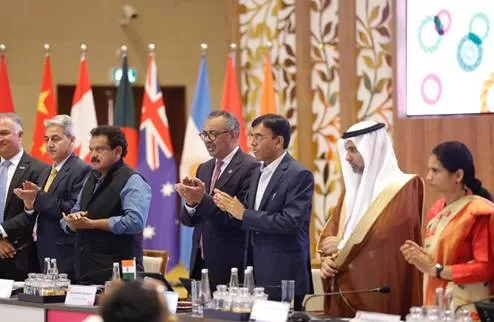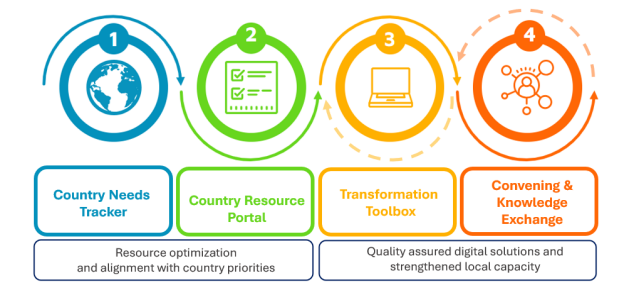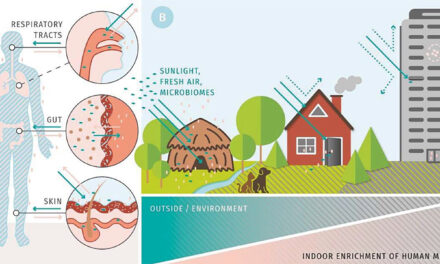
“Today is a momentous day in the history of the G20 Health Working Group, wherein, G20 countries not only identified a priority for its relevance but collectively worked towards its launch.” This was stated by Dr Mansukh Mandaviya, Union Minister for Health and Family Welfare during his keynote address on “Digital Health Innovation & Solutions to aid Universal Health Coverage and Improve Healthcare Service Delivery” at the G20 Health Ministers’ Meeting, here today in the presence of Dr Tedros Adhanom Ghebreyesus, Director General, World Health Organization (WHO). Dr Bharati Pravin Pawar and Prof. S P Singh Baghel, Union Ministers of State for Health and Family Welfare and Dr V K Paul, Member (Health), NITI Aayog were also present.
Highlighting that the world today is witnessing an exponential rise in digital health solutions that are focused on vertical health programmes, the Union Health Minister stated that “this siloed approach and fragmented digital solutions results in significant workload on health workers, inefficiencies due to duplication and lack of interoperability. India’s G20 presidency has leveraged its experience on developing a national digital health architecture through the convergence of digital health interventions aimed at health systems strengthening through interoperability by design”. In this regard, Dr Mandaviya applauded the efforts and cooperation of G20 countries, Invited Countries, International Organizations and other stakeholders for collectively recognizing the need of a common framework to integrate all initiatives by consolidating efforts and investments made in the digital health space and creating a comprehensive digital health ecosystem through the ‘Global Initiative on Digital Health – a WHO Managed Network.’
 The Union Health Minister also highlighted the significant strides taken by India in implementing innovative digital health solutions at the national level, while also being a strong vocal advocate of the digital agenda in the global arena under the leadership of the Hon’ble Prime Minister, Shri Narendra Modi. He also reminded the dignitaries that India led the Digital Health resolution at 71st World Health Assembly in 2018 in Geneva which spurred global action on this vital agenda. He further stated that India as a chair of Global Digital Health Partnership and Commonwealth Technical Working Group has highlighted the importance of the digital health for health systems strengthening as a critical enabler of national policies.
The Union Health Minister also highlighted the significant strides taken by India in implementing innovative digital health solutions at the national level, while also being a strong vocal advocate of the digital agenda in the global arena under the leadership of the Hon’ble Prime Minister, Shri Narendra Modi. He also reminded the dignitaries that India led the Digital Health resolution at 71st World Health Assembly in 2018 in Geneva which spurred global action on this vital agenda. He further stated that India as a chair of Global Digital Health Partnership and Commonwealth Technical Working Group has highlighted the importance of the digital health for health systems strengthening as a critical enabler of national policies.
Dr. Tedros Adhanom Ghebreyesus emphasized that “the GIDH is an integrative step that fosters equity in healthcare by converging efforts and best practices. It will amplify our efforts with the incorporation of tools, such as AI while giving due importance to ethics, policy, and governance. “Ensuring global healthcare isn’t something that we can do alone. The GIDH will ensure inclusivity, integration, and alignment of our goals by not leaving anyone behind”, he further stated.
Dr Tedros also emphasized that “WHO has been committed to use the latest technologies for health. He stated that “over the last two decades, the power of digital health technologies like telemedicine and AI has had a significant impact across the world”. “The power and capacity of digital technology have expanded at an unprecedented rate over the past two decades. The potential and successful implementation of technology during the times of severe healthcare disruptions was evident during COVID-19 in the form of telemedicine usages”, he said.
The Global Initiative on Digital Health (GIDH) will consolidate the evidence and amplify recent and past gains in global digital health for health systems while strengthening mutual accountability to enhance the impact of future investments. The GIDH will be a WHO Managed Network (“Network of Networks”) that will promote equitable access to digital health by addressing challenges such as duplication of efforts and “products-focused” digital health transformation through a focus on following four foundational pillars:

The key components of the GIDH will leverage existing evidence, tools and learnings and will be co- created through a transparent and inclusive process. Through this evidence-based and comprehensive co-creation process, GIDH will ultimately aim to:
- ALIGN efforts to support the Global Strategy on Digital Health 2020–2025;
- SUPPORT qualityassured technical assistance to develop and strengthen standards-based and interoperable systems aligned to global best practices, norms and standards;
- FACILITATE the deliberate use of quality assured digital transformation tools that enable governments to manage their digital health transformation journey.
The Global Strategy on Digital Health was endorsed by Member States in 2020 as a way to align actions and goals, while defining a roadmap towards digital health transformation. The GIDH will enable us to address over 70% of the proposed actions in the Global Strategy.
During the session, Dr Mandaviya also launched the World Bank’s Flagship Report on “Digital in Health – Unlocking Value for Everyone”. The report is intended to give countries confidence and practical guidance on where to start digital health implementation, regardless of the country’s stage of digital maturity or fiscal challenges.
H.E. Fahad bin Abdurrahman Al-Jalajel, Health Minister of Saudi Arabia highlighted the critical role played by telemedicine in improving healthcare around the world. He also stressed the need to take advantage of the possibilities that new technologies like AI can offer in healthcare.
H.E. Budi Sadikin, Health Minister of Indonesia emphasized on their ongoing work on creating different health databases as part of their effort to digitise health records.
 H.E. Dr Nisha Trindade, Health Minister of Brazil underlined that digital health is a crucial tool to ensure universal health coverage. She stated that digital health should be guided by certain principles like data protection, equality etc.
H.E. Dr Nisha Trindade, Health Minister of Brazil underlined that digital health is a crucial tool to ensure universal health coverage. She stated that digital health should be guided by certain principles like data protection, equality etc.
Underscoring the importance of convergence approach to integrate disparate systems under an integrated digital health ecosystem umbrella, Shri Sudhansh Pant, Union Health Secretary highlighted India’s mammoth effort for establishing a comprehensive digital health ecosystem through the Ayushman Bharat Digital Mission (ABDM). He stated that “with a view to avoid “re-invention of wheel multiple times”, we are keen on sharing our learnings of the same with the world. This approach of sharing is linked to India’s philosophy of “Vasudhaiva Kutumbakam” (i.e. Whole World Is One Family). This inspires each and every one of us to move beyond the concept of country-specific resources and share”.











